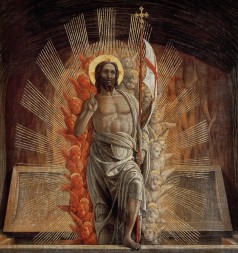March 23, 2016 // Uncategorized
The celebration of Easter within the Jubilee Year of Mercy

The Risen Christ is depicted in the painting “Resurrection” by 15th-century Italian master Andrea Mantegna. Easter, the chief feast in the liturgical calendars of all Christian churches, commemorates Christ’s resurrection from the dead. Easter is March 27 this year.
What is the connection between Easter, the celebration of Christ’s resurrection, and mercy? The revelation of God’s mercy and love is found on every page of Sacred Scripture. That revelation reaches its climax in the Paschal Mystery of the Death and Resurrection of Jesus. We recognize the suffering and death of Jesus as truly the deepest sign of how much God loves us. We see the merciful heart of God in the pierced heart of His Son. But what about the Resurrection?
The Resurrection of Jesus reveals to us the triumph of divine mercy. Saint John Paul II wrote the following: “The fact that Christ was raised the third day constitutes the final sign of the messianic mission, a sign that perfects the entire revelation of merciful love in a world that is subject to evil. At the same time it constitutes the sign that foretells ‘a new heaven and a new earth’, when God ‘will wipe away every tear from their eyes, there will be no more death, or mourning, no crying, nor pain, for the former things have passed away’ (Revelation 21:4).”
The Father shows mercy to us in the Resurrection of His Son since we are given the promise of a share in His Resurrection. The Resurrection can be considered an act of mercy because it is an act of love. It shows us that the love of God is more powerful than death, just as the crucifixion shows that the love of God is more powerful than sin. The death and resurrection of Jesus gives us access to eternal life in heaven.
It is significant that in the Risen Lord’s first appearance to the apostles on the first Easter night, He gave them the authority to forgive sins in His name. He breathed the Holy Spirit on them and said: “Whose sins you forgive, they are forgiven. Whose sins you hold bound, they are held bound.” Jesus gave the apostles and their successors the power to forgive sins — the greatest mercy! We will hear this Gospel on the Second Sunday of Easter, appropriately called Divine Mercy Sunday. Through His death and resurrection, God’s love and mercy triumphed over sin and death. Thankfully, that love and mercy is communicated to us in the sacraments, including the great sacrament of mercy instituted that first Easter night.
Easter is a feast of hope. It reminds us that our sins and failings and regrets do not have the last word. There is always the possibility of a new beginning, thanks to God’s mercy. Sin does not have the last word. Death does not have the last word. Love and mercy have the last word. What is broken can be repaired. Christ always can restore our hope, if we only let Him. If we believe in God’s love, we must believe in His mercy. As Saint John Paul II once said: “mercy is love’s second name.”
It is good to remember that the Risen Body of Jesus still bears the five wounds of His crucifixion. Why did God not just take them away? I think it is because God wants us to remember the depths of His mercy. The wounds remain as healing mercy for us.
The whole Paschal Mystery is a mystery of mercy, including the Resurrection. Just as we solemnly celebrate Christmas for eight days (the Octave of Christmas) so we also solemnly celebrate Easter for eight days (the Octave of Easter). I will be celebrating many Confirmation Masses during the Easter Octave. It is a special time to celebrate the coming of the Holy Spirit upon so many of our young people.
I pray you all have a very happy and blessed Easter Sunday and Octave of Easter in this Jubilee Year of Mercy. In the Responsorial Psalm (Psalm 118) on Easter Sunday, we will sing of God’s mercy as we pray:
Give thanks to the Lord, for he is good, for His mercy endures forever.
Let the house of Israel say, His mercy endures forever.
The best news. Delivered to your inbox.
Subscribe to our mailing list today.






